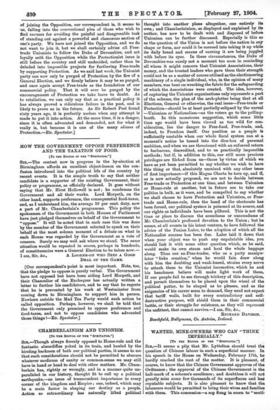HOW THE GOVERNMENT OPPOSE PREFERENCE AND THE TAXATION OF FOOD.
150 THE EDITOR OF THE "SPECTATOR]
Slit,—The contest now in progress in the by-election at Birmingham affords an excellent object-lesson on the con- fusion introduced into the political life of the country by recent events. It is the simple truth to say that neither candidate is a supporter of the existing Government, their policy or programme, as officially declared. It goes without saying that Mr. Hirst Hollowell is not ; he condemns the Government and all their works. Lord Morpeth, on the other hand, supports preference, the consequential food-taxes, and, as I understand him, the average 10 per cent. duty, now a part of Mr. Chamberlain's programme. This policy the spokesmen of the Government in both Houses of Parliament have just pledged themselves on behalf of the Government to "oppose." It will be noted that in each case this was done by the member of the Government selected to speak on their behalf at the most solemn moment of a debate on what in each House was regarded by the Government as a vote of censure. Surely we may well ask where we stand. The same situation would be repeated in scores, perhaps in hundreds, of constituencies were a General Election to be taken now.—
I am, Sir, &.c., A LOOKER-ON WHO SEES A GOOD
DEAL OF THE GAME.
[Our correspondent's point is most important. Note, too, that the pledge to oppose is purely verbal. The Government have not opposed but have been aiding Lord Morpeth, and their Chancellor of the Exchequer has actually written a letter to further his candidature, and to say that he regrets that he is prevented by his work at Westminster from coming down to Birmingham to support him in person. Nowhere outside the Mad Tea Party would such action be called opposition. Perhaps, however, we shall be told that the Government only promised to oppose preference and food-taxes, and not to oppose candidates who advocated those things 1—En. Spectator.]










































 Previous page
Previous page